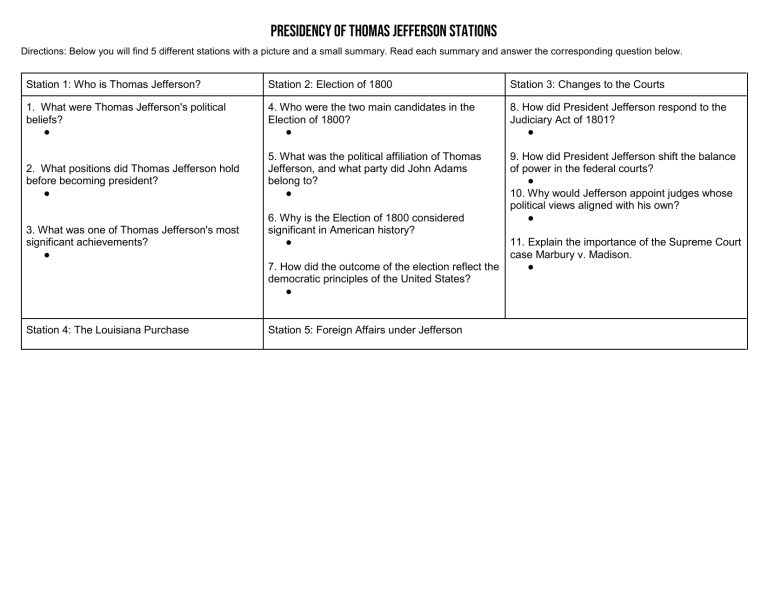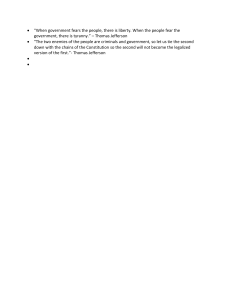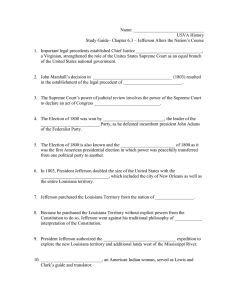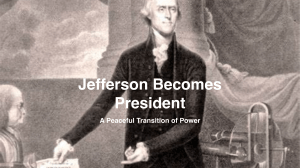
Presidency of Thomas Jefferson Stations Directions: Below you will find 5 different stations with a picture and a small summary. Read each summary and answer the corresponding question below. Station 1: Who is Thomas Jefferson? Station 2: Election of 1800 Station 3: Changes to the Courts 1. What were Thomas Jefferson's political beliefs? ● 4. Who were the two main candidates in the Election of 1800? ● 8. How did President Jefferson respond to the Judiciary Act of 1801? ● 2. What positions did Thomas Jefferson hold before becoming president? ● 5. What was the political affiliation of Thomas Jefferson, and what party did John Adams belong to? ● 9. How did President Jefferson shift the balance of power in the federal courts? ● 10. Why would Jefferson appoint judges whose political views aligned with his own? ● 3. What was one of Thomas Jefferson's most significant achievements? ● 6. Why is the Election of 1800 considered significant in American history? ● 7. How did the outcome of the election reflect the democratic principles of the United States? ● Station 4: The Louisiana Purchase Station 5: Foreign Affairs under Jefferson 11. Explain the importance of the Supreme Court case Marbury v. Madison. ● 12. Why was the Louisiana Purchase controversial in terms of the U.S. Constitution? ● 16. What was the Embargo Act of 1807, and why did President Jefferson enact it during his presidency? ● 13. How did the Louisiana Territory change hands before it was offered for sale to the United States? ● 17. What did the Barbary Wars reveal about the nation's foreign policy at the time? ● 14. What were the initial concerns and opposition to the Louisiana Purchase? ● 18. How did the Napoleonic Wars in Europe impact the United States' foreign policy? ● 19. What was the primary foreign policy objective of President Jefferson's administration, and how did it influence the United States' response to conflicts between France and Britain? ● 15. What were the significant effects of the Louisiana Purchase on the United States? ● Station 1: Who is Thomas Jefferson? Before becoming President of the United States, Thomas Jefferson had a rich and varied life and career. He was born in 1743 in Virginia and went on to study law at the College of William & Mary. He became a prominent lawyer and a member of the Virginia House of Burgesses. In 1775, he was appointed to the Continental Congress and played a crucial role in drafting the Declaration of Independence in 1776. Jefferson later served as the Governor of Virginia and as a minister to France. His authorship of the Declaration of Independence and his advocacy for religious freedom solidified his place as a key figure in the American Revolution. He served as the United States Secretary of State under President George Washington and as Vice President under John Adams. These experiences set the stage for his eventual presidency in 1801. Jefferson's political beliefs were shaped by his experiences and education. He believed in the rights of the American people and the importance of individual liberties. Jefferson believed that all people were entitled to "life, liberty, and the pursuit of happiness" and that they had the right to reject any government that did not protect these rights. He also believed in the separation of church and state, religious freedom, and free public education. Jefferson's political philosophy was rooted in the idea of a small, independent farmer as the ideal citizen. He believed that the United States should be an agrarian republic, where people did not depend on other people to survive. He believed in a strict interpretation of the Constitution, meaning the federal government should only do what the Constitution clearly said it could. Jefferson also supported the idea that states should have more power than the federal government. Because of this, he supported a bill of rights added to the Constitution. Station 2: The Election of 1800 The election of 1800 was a major turning point in American history, shaping the trajectory of the young republic. The contest between incumbent President John Adams, a Federalist, and Thomas Jefferson, a Democratic-Republican, was marked by intense political rivalry and groundbreaking consequences. The Election of 1800 was a fierce battle of ideologies. The Federalists, led by John Adams, favored a strong federal government, an industrial economy, and close ties with Britain. The Democratic-Republicans, led by Thomas Jefferson, advocated for limited federal power, agrarianism, and a pro-French stance. The campaign was characterized by sharp political attacks, with Federalist newspapers denouncing Jefferson as an atheist and revolutionary, while Jefferson's camp accused Adams of monarchism and betraying republican principles. Despite the heated rhetoric, the most remarkable aspect of the Election of 1800 was the peaceful transfer of power that ensued. Thomas Jefferson's victory marked the first time in history that power shifted from one political party to another through an electoral process in a peaceful and orderly manner. This transfer of power cemented the principles of democracy and reinforced the stability of the young United States. Additionally, the 12th Amendment, which clarified the process for electing the President and Vice President, was ratified in response to the challenges of the 1800 election. The 12th Amendment allows candidates for president and vice president to run on the same ticket, ensuring similar political views between the two leaders and allowing those in the executive office to work cooperatively. Station 3: Changes to the Courts The presidency of Thomas Jefferson, from 1801 to 1809, marked a pivotal period in American history. Jefferson's vision of a more democratic and agrarian America had far-reaching effects, including significant changes in the federal courts. One of the most significant early changes during Thomas Jefferson's presidency was the repeal of the Judiciary Act of 1801, which had been passed during the waning days of his predecessor, John Adams. This act had expanded the federal judiciary by creating new judgeships, leading to the infamous "midnight appointments," men who were given the job at the last minute of Adam’s presidency Jefferson, seeing this as an attempt by the Federalist Party to maintain control over the courts, worked to dismantle it. In March 1802, Congress repealed the act, reducing the number of federal judges and eliminating some newly created courts. This change shifted the balance of power in the federal courts in favor of the Democratic-Republicans. In addition to eliminating Federalist judgeships, President Jefferson worked to fill vacancies with judges who shared his political ideology. He appointed individuals who were aligned with his vision of a limited federal government and states' rights. These Republican judges played a crucial role in shaping the legal landscape, as they interpreted the Constitution and federal laws in ways that often reflected the Jeffersonian principles. The landmark Supreme Court case of Marbury v. Madison in 1803 had a profound impact on the federal courts during Jefferson's presidency. The case established the principle of judicial review, giving the federal courts the authority to review and potentially invalidate legislative acts that conflicted with the Constitution. While the case itself didn't directly favor Jefferson's party, the concept of judicial review ultimately strengthened the judiciary's role in checking the power of both the executive and legislative branches. Station 4: The Louisiana Purchase In 1803, President Thomas Jefferson made the decision to acquire the Louisiana Territory, which effectively doubled the size of the United States. This decision was controversial because the US Constitution did not explicitly give the president the power to purchase territory. However, Jefferson believed that the purchase would benefit the country's future and enlisted Meriwether Lewis and William Clark to explore the new territory. The Louisiana Territory had changed hands between France and Spain multiple times, but in 1800, Spain ceded the territory to France. Napoleon, who was focused on war in Europe, saw the territory as a burden and offered to sell it to the United States for $15 million. Jefferson, who believed in a strict interpretation of the Constitution, initially questioned the constitutionality of the purchase. The Federalists also opposed the purchase because they feared it would lead to the admission of new slave states. Despite these concerns, Jefferson agreed to the deal, effectively doubling the size of the United States. He saw the Louisiana Territory as an important element for the country's future. The Louisiana Purchase had far-reaching effects on the United States. It greatly strengthened the country materially and strategically, providing a powerful boost for westward expansion. The purchase confirmed the doctrine of implied powers of the federal Constitution. It also had a significant impact on Native American peoples, as their lands were now part of the expanding United States. The Louisiana Territory would eventually be carved into 15 Western states, stretching from the Gulf of Mexico to Canada. Station 5: Foreign Affairs of Thomas Jefferson During Thomas Jefferson's presidency from 1801 to 1809, the United States faced a complex web of foreign affairs challenges that required a delicate balance of principles and pragmatic decision-making. The primary foreign policy objective of Jefferson's administration was to maintain and protect American power and neutrality in the face of the ongoing conflicts between European powers, particularly France and Britain. Jefferson aimed to keep the United States out of the wars and entanglements of Europe, safeguard American trade and maritime rights, and preserve the nation's independence One foreign policy challenge during Jefferson's presidency was the ongoing conflict between France and Britain, which often resulted in American ships being seized and American sailors being impressed into British service. In an attempt to assert American neutrality and protect its sovereignty, Jefferson enacted the Embargo Act of 1807, which prohibited American ships from trading with foreign nations. While the act aimed to avoid military conflict, it had severe economic consequences, leading to widespread smuggling and economic hardship, ultimately revealing the complexities of maintaining a neutral stance in global conflicts. Jefferson's presidency also saw the United States engage in military conflicts overseas. The Barbary States in North Africa, particularly Tripoli, demanded tribute from American merchant vessels. Jefferson, committed to protecting American interests and refusing to pay tribute, sent the fledgling U.S. Navy to combat the Barbary pirates. The Barbary Wars demonstrated the young nation's resolve to safeguard its interests and maintain its honor abroad. Jefferson's foreign policy faced further challenges due to the ongoing Napoleonic Wars in Europe. The United States dealt with the Napoleonic Wars by initially pursuing a policy of neutrality, which evolved into trade restrictions. As both France and Britain sought to restrict American trade with the other, it became increasingly difficult to remain neutral. The United States had to navigate the treacherous waters of international diplomacy to protect its economic interests.




